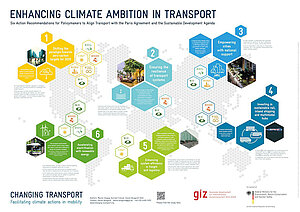NDC enhancement: Improved climate change mitigation in the transport sector necessary
![[Translate to English:] Six recommendations for a climate-friendly transport sector](/legacy/_processed_/a/0/csm_200617_NDCs_Enhancement_GIZ_b2c36c55e3.jpg)
In 2020, countries will submit their revised NDCs. An IKI project compiled six recommendations on how to enhance ambition for climate action in the transport sector.
187 countries signed the Paris Agreement and committed themselves to robust climate action. In 2020, they are expected to submit revised NDCs. These plans are an opportunity to ramp up commitments and create strategies that are ambitious enough to avert dangerous climate change.
Particularly the transport sector remains a key source of concern. Vehicle emissions continue to rise in most countries and many officials still struggle to find the information that is needed to translate their plans into concrete measures. Without swift, ambitious action to reengineer the transport sector, it will be impossible to meet the 1.5°C objective.
Against this backdrop, the IKI project "Supporting climate strategies in countries where motorisation is rapidly increasing" which is being implemented by GIZ, has synthesized key documents on enhancing ambition in the transport sector into the paper "Enhancing Climate Ambition in Transport". Aiming to support policymakers in better understanding options for additional climate action, it distils this vast amount of information into six clear, essential recommendations:
- Shifting the mobility paradigm towards zero-carbon targets for 2050
- Ensuring the resilience of transport systems
- Empowering cities with national support
- Investing in sustainable rail, waterways and multimodal hubs
- Enhancing system efficiency in freight and logistics
- Accelerating electrification with renewable energy
In addition to enabling emission reductions, the recommendations address various sustainable development challenges in the transport sector. Beyond fighting climate change, taking action in all six areas will thus help to reduce air pollution, noise and congestion, while also enhancing access to mobility, road safety and the efficiency of the freight sector.
To provide a platform for government officials to understand and explore these challenges and opportunities, these recommendations have also been further dissected in a series of regional peer-learning workshops in Colombia and Kenya.
Time for Action
The next five years will be crucial for steering the sector towards zero-carbon transport. In addition to implementing GHG reduction measures, countries around the globe have been establishing systems to monitor and report their achievements. Decisive action will be required over the next years to achieve commitments set in the first NDCs.
Given the scope of change required, a comprehensive policy approach will be essential to coordinate trends, provide attractive alternatives to unsustainable modes of transport, and maximise the benefits for the climate and human welfare.
Thus, as policymakers draft their upcoming NDCs, it is to be hoped, that they will heed these recommendations to enhance ambition and keep global warming below 1.5°C.
The link has been copied to the clipboard
Contact
IKI Office
Zukunft – Umwelt – Gesellschaft (ZUG) gGmbH
Stresemannstraße 69-71
10963 Berlin













